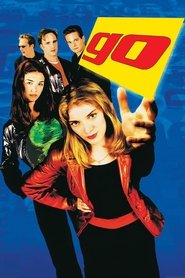The only one who is remotely sensible in this movie is Katie Holmes: Go figure, you could say.
Although clearly part of the broader Pulp Fiction run-off, this movie actually seems to be saying something interesting for the first forty minutes, even if it's watered down when compared to, say, Trainspotting (1996). And so when our protagonisté is brutally run over by a random car completely out of the blue, I felt something of the same kind of epistemological shock that viewers must have felt when Marion Crane was pushed into Norman Bates' lake forever at the 47-minute mark. Unfortunately, where the movie goes next is a bit underwhelming even for 1999, and I have some sympathy for Sony Pictures who apparently wanted to cut the whole Vegas chapter.
The sort of movie that's so enthusiastically American, you'd almost think it was directed by a foreigner.
— Mary Elizabeth Williams (Salon)
The point of this Rashomon for the rave set is not the lesson learned – that sort of bogus movie moralizing went out with $5 tickets – but the intoxication of the thing itself. […] Despite its go-to-hell hipster milieu and bad intentions, Go is really a kind of old-fashioned storytelling where the raconteurship is as important as the tale itself.
— Michael O'Sullivan (Washington Post)
In the same way that Trainspotting had conjured up the under-the-nail scuzz of midnineties junkie culture, Go embodied the sweaty, sometimes smush-brained euphoria of Generation Ecstasy, pinging between car-crashing action and hallucinatory comedy[.]
— Brian Raftery (Best Movie Year Ever: How 1999 Blew Up the Big Screen)

